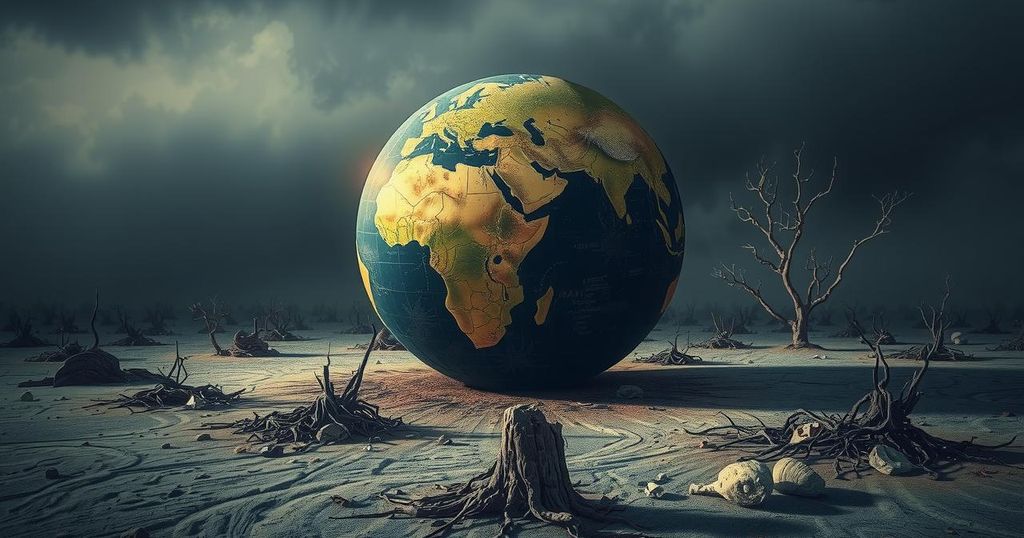Impact of Trump’s Aid Freeze on Africa: A Looming Humanitarian Crisis

Africa has reacted to President Trump’s ‘America First’ pledge with trepidation, particularly after a freeze on U.S. foreign aid that hindered crucial health and educational initiatives. The halt has adversely impacted organizations fighting child marriages and facilitating HIV treatment. Concerns have arisen about program sustainability and the health care of millions, particularly in regions facing ongoing health crises.
Africa has been apprehensive about the implications of President Donald Trump’s ‘America First’ pledge, reflecting concerns that their continent would be deprioritized. This unease was exacerbated when, shortly after Trump’s executive order to freeze foreign aid, local organizations like those led by Claris Madhuku in Zimbabwe ceased operations without prior warning. The halt impacted various vital programs aimed at preventing child marriages and promoting education among girls, indicating broader repercussions for sub-Saharan Africa.
Despite subsequent outrage leading to some exemptions, the freeze on U.S. humanitarian assistance, totaling over $6.5 billion last year, still poses significant challenges to social and health initiatives throughout the region. The President’s Emergency Plan for AIDS Relief (PEPFAR), a notable success in combating HIV/AIDS in Africa, now faces uncertainty, jeopardizing treatment for millions. This is particularly concerning for countries like South Africa, where approximately 8 million people live with HIV.
As U.S. Secretary of State Marco Rubio outlined, the aid freeze’s exemptions for life-saving services lack clarity, leaving many organizations doubtful about their funding eligibility. Numerous PEPFAR-supported facilities, including those in Johannesburg’s Soweto township, have experienced closures, driving patients to seek services at overburdened government clinics. The fear of deterioration in health outcomes has rippled through communities reliant on consistent treatment.
Experts warn that any pause in antiretroviral treatment can lead to dangerous health consequences. Charles Kenny from the Center for Global Development emphasized that interruptions in treatment can quickly result in increased viral loads among patients. Furthermore, aid groups face restrictions on public communications regarding funding, raising concerns over accountability and transparency within U.S. aid dynamics.
Beyond its effects on health systems, the aid freeze endangers populations living in conflict zones, as exemplified by the humanitarian crisis in eastern Congo. At least 1.2 million individuals could lose access to critical support. Similarly, in war-torn Sudan, the freeze poses severe risks for public health amid existing cholera and malaria outbreaks. Despite stated exemptions, many organizations still await official guidance on resuming their operations.
The implications of Trump’s aid freeze introduce a precarious situation for countless communities in Africa, highlighting the essential role that U.S. assistance has played in transformative health initiatives. Any long-term disruption threatens to unravel decades of progress made in managing health crises, particularly among vulnerable populations during lapses in funding. The article sheds light on the urgent need for clarity and sustained commitment to U.S. aid efforts in the region.
The article discusses the immediate effects of an executive order by President Donald Trump, which froze almost all U.S. foreign aid, particularly affecting programs in Africa. Many organizations dedicated to education and health support, such as those addressing child marriage and HIV/AIDS, were left without warning. The situation outlines a dire humanitarian impact on the African continent, revealing how U.S. aid is essential for sustaining health initiatives. It raises concerns over the abrupt cessation of funding amidst ongoing crises in various countries like South Africa and Sudan.
In conclusion, the freezing of U.S. foreign aid under Trump’s administration poses severe repercussions for Africa, particularly in the domain of health and social welfare. Organizations are struggling to maintain operations vital for addressing issues like child marriage and HIV/AIDS amidst funding uncertainty. The humanitarian impact is profound, risking setbacks in progress made over the past decades, particularly in regions already facing significant challenges. A clear commitment to international aid is crucial for restoring stability and supporting vulnerable populations.
Original Source: apnews.com







